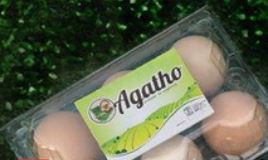Improving Farm
Animal Welfare
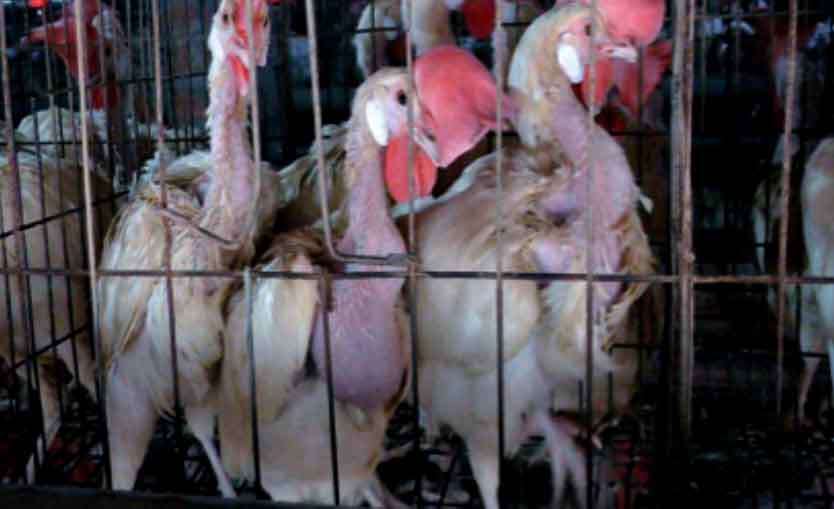
BATTERY CAGE SYSTEM
Could you live in a cage, unable to move, confined so extremely, often among the remains of people who have already died’? Surely, you would not survive, but this is how millions of hens in the egg industry arc forced to live.
Nearly all of the 150 million hens used in commercial egg production in Indonesia spend their entire lives confined in small wire or bamboo enclosures known as “Battery cages”.
Battery cages are considered one of the cruelest forms of animal confinement by animal welfare experts.
In these cages, hens live miserable and deprived lives under constant stress and frustration. They are unable to walk freely and cannot even spread their wings completely. Their beaks are cut-off but they can still peck each other to death
Each cage confines 5 to 10 hens. Conditions arc often filthy. Many hens do not survive and those who do are often forced to live with the rotting remains of those who died. Hens in Battery cages are continuously fed antibiotics to control disease and promote growth.
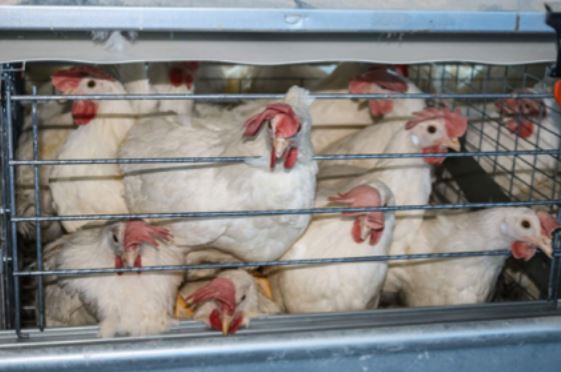
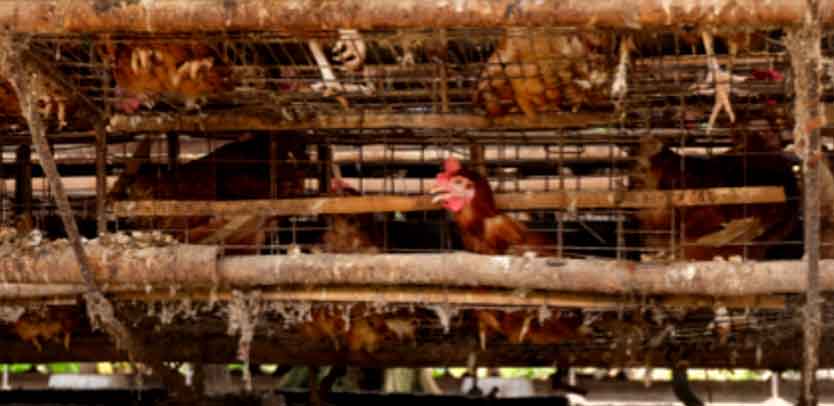
Chickens are sentient beings and it is unacceptable
to keep them in cruel cages for their entire lives!
Scientific research from renowned experts proves that chickens arc just as cognitively, emotionally and socially complex as most other birds and mammals in many areas.
There are Alternatives !
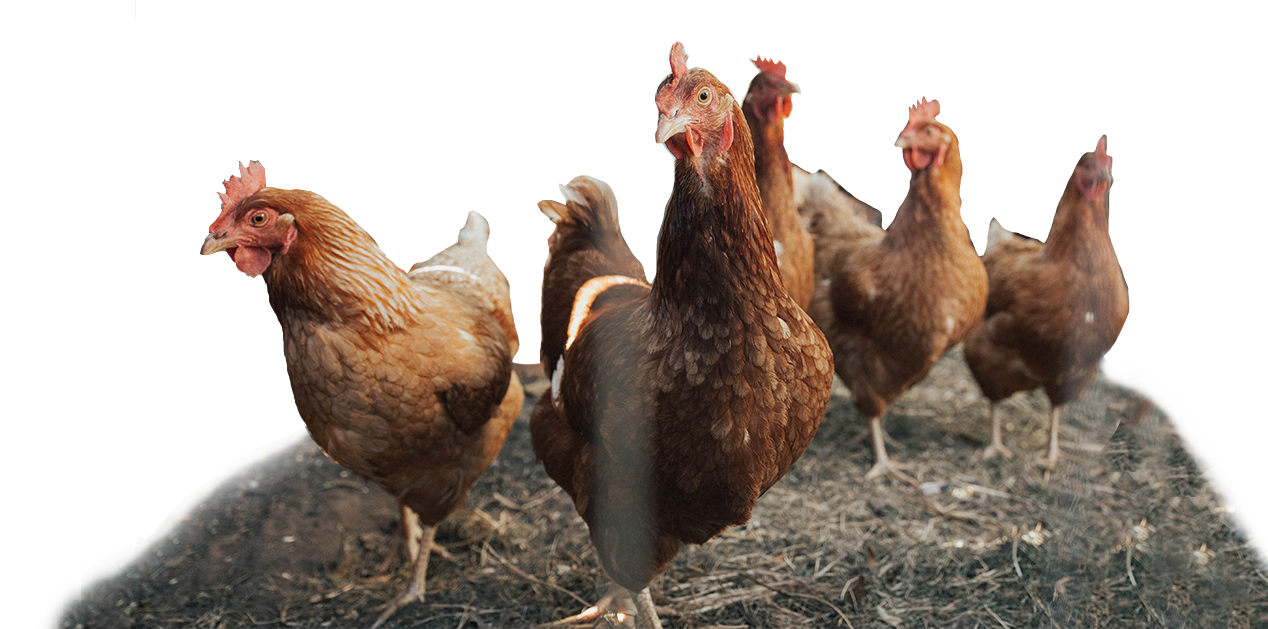
CAGE FREE SYSTEM
In Cage-free farms, hen live in shed without outdoor access. Inside the sheds, however, they can move around, can roost on perches, can peck at straw or sand and have access to nest boxes where they can lay their eggs. The fact that hens can perform many their natural behaviors significantly reduces their suffering.
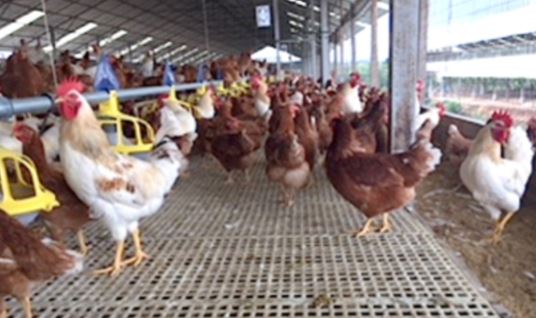
Hens in Cage-free systems are not continously force fed antibiotics and often receive only vegetarian feed.
FREE RANGE OR ORGANIC SYSTEMS
In these systems, hens are access to pastures during the daytime where they can enjoy sunlight and spend their time digging at the ground looking for insects and food. At night they can sleep in sheds. In both of these systems the feed must be pesticide / chemical free. The continous use of antibiotics is forbidden.
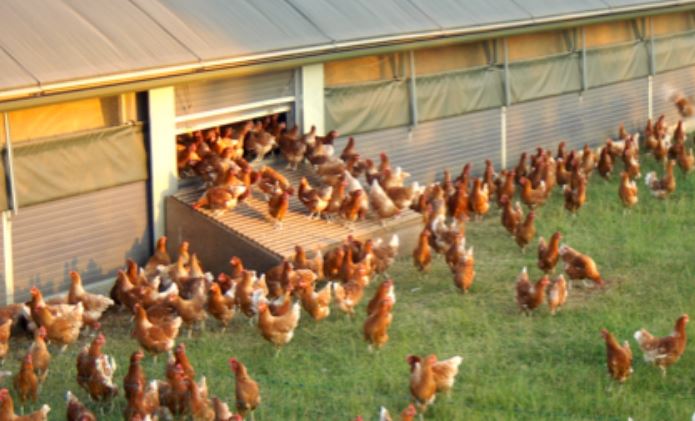
*NOTE: Village chicken eggs are not always produced in free range system. Many farmers keep them in battery cages too.
INCREASED LEVEL OF FOOD SAFETY
Eggs often contaminated by salmonella, a bacteria which makes thousands of people got sick every year, even causing death, especially to children worldwide.
European Food Safety Authority did an extensive research by comparing salmonella in battery cages system to cage free system.
This analysis found 43% lower chance of Salmonella Enteritidis contamination in cage free system, where chickens grow in closed barn istead of battery cages. In organic eggs production, there is a 95% lower chance of Salmonella Enteritidis contamination. In free range system, the chance is 98% lower.
For Salmonella Typhimurium, there is a 77% lower chance of salmonella contamination in free cage system compared to in battery cage system and 93% lower chance in organic system and free range system.
For other Salmonella stereotypes, compared to systems where chickens have to live in cages , there is a 96% lower chance in barn system, ebih rendah dalam sistem lumbung, 98% lower chance in organic farming, and 99% lower chance in free range poultry.
That means there is at least 25 times higher chance for contamination in fams that limited its chicken in battery cages compared to free cage systems. European Food Safety Authority analysis concluded that: “Keeping poultry in battery cages has more chance to be contaminated with salmonella.”
Another important topic is the antibiotic intake. In intensive caging system, also known as factory farming, it is very common that animals will be given antibiotics constantly, even when they are not sick. Now there are evidences that this irresponsible practices is increasing absorption to spread super bacteria that is resistant to antibiotics..
The World Health Organization already issued a warning that when the irresponsible use for antibioticcs on animals and human is allowed, then we could experience a post-antibiotic period when curable diseases can caused death
LOWER ENVIRONMENTAL IMPACT
In the farms that use natural system – such as free range and organics – the animals are often fed with plant based food, On the other hand, factory farming use animal food – such as fishmeal.
Researches showed that we can reduce negative impact on our environment from layer chicken farming, for instance, using only vegetarian food. The scientists at University of British Columbia has concluded that when layer chickens only consume organics and vegetarian food, this can reduce CO2 more than 50%.
The use of fishmeal as animal food has raised some attention. According to the UN, around 15 million tons fish were caught every year to produce fishmeal and mostly used in chicken farms.
UN also stated that more than 70% of world fisheries are from over exploitation.
Some species of fish that were caught has extinct commercially, and more are nearly extinct.
Our marine environment and threats from climate change are issues that cannot be ignored. This is the time to be comcern and support environment friendly farms that only use vegetarian food.
WONDERING
HOW CAN YOU HELP ?
You can choose to buy eggs from Cage-free egg farms ! These are eggs producers in Indonesia that have already transitioned from Battery Cages to Cage-free systems. When you can buy from them, you are supporting better lives for egg laying hens.
The current Cage-free producers are Healthy Eggs (from Sukabumi) and Agatho Eggs (from Bogor).
Take care when choosing your eggs because some producers claim to be Organic or Free range but they are actually still using Battery cage systems. They are mislabeling their product to fool customers. Write to us and send photos if you find Cage-free, Free Range or Organic eggs in supermarket. We will check!
Healthy Egg product from Sukabumi
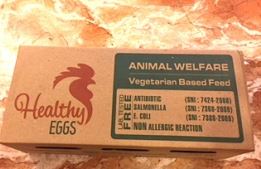
Healthy Egg product from Agatho Bogor
